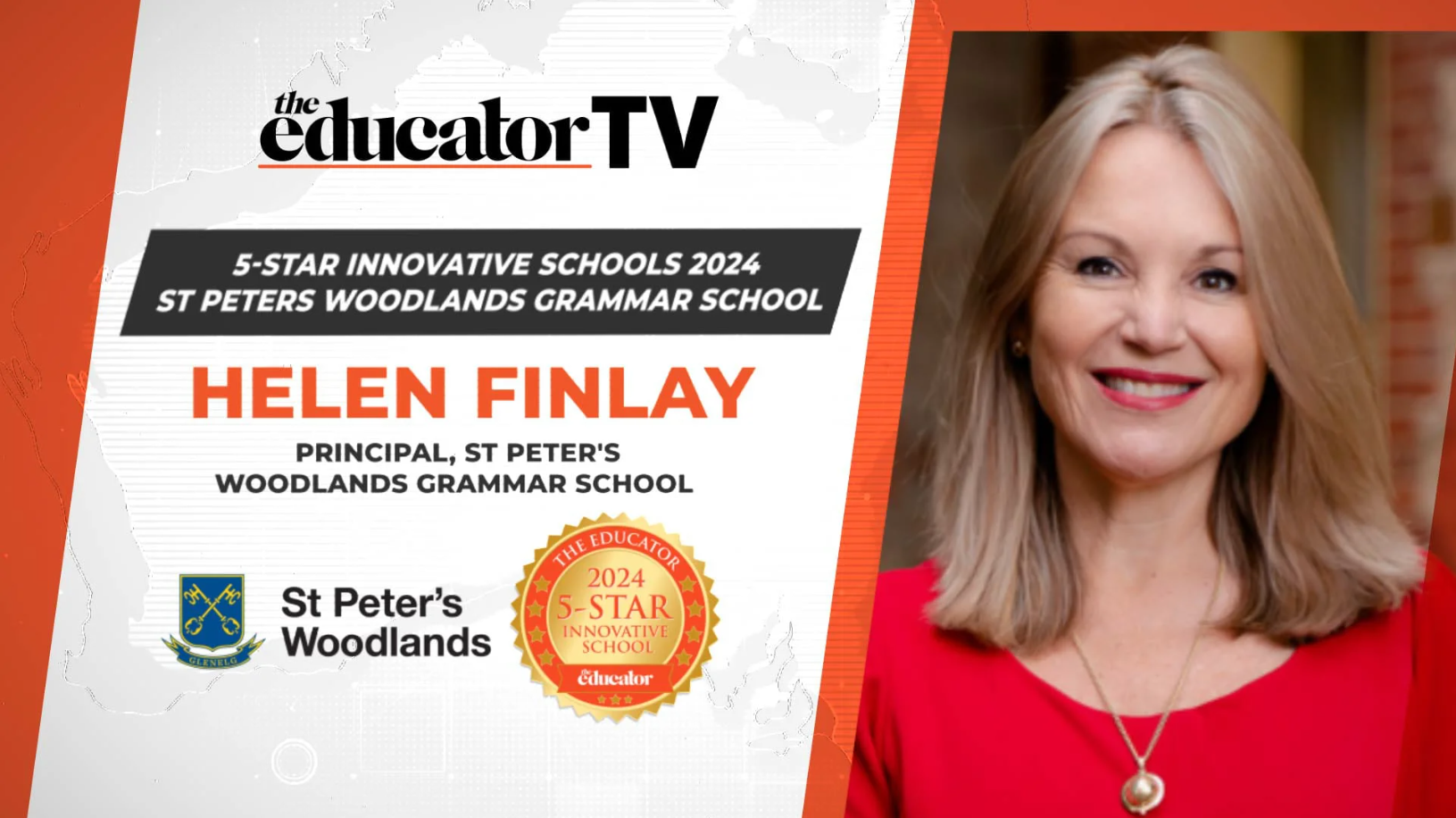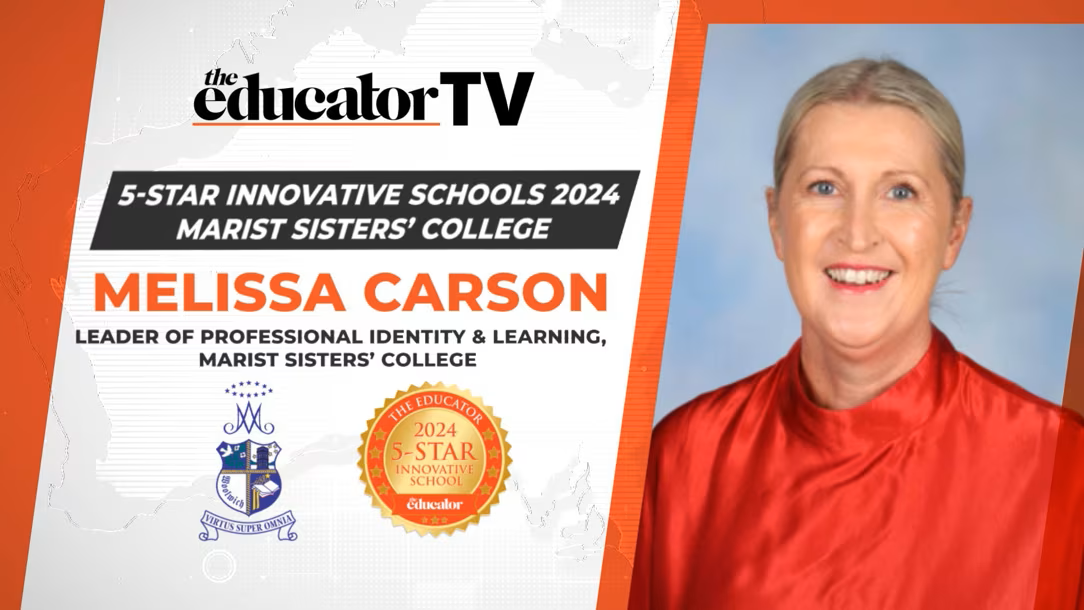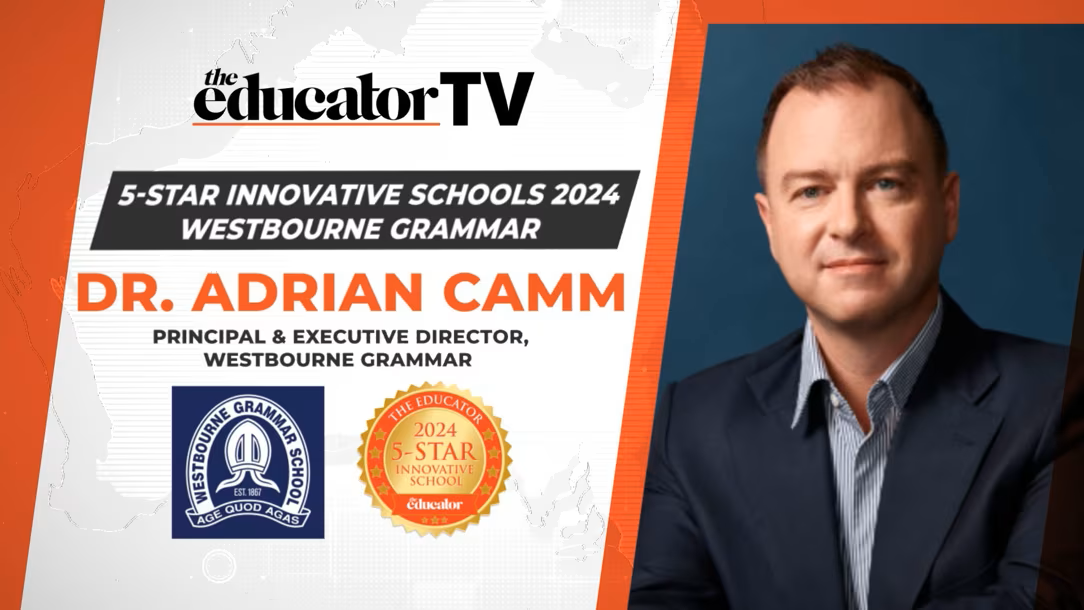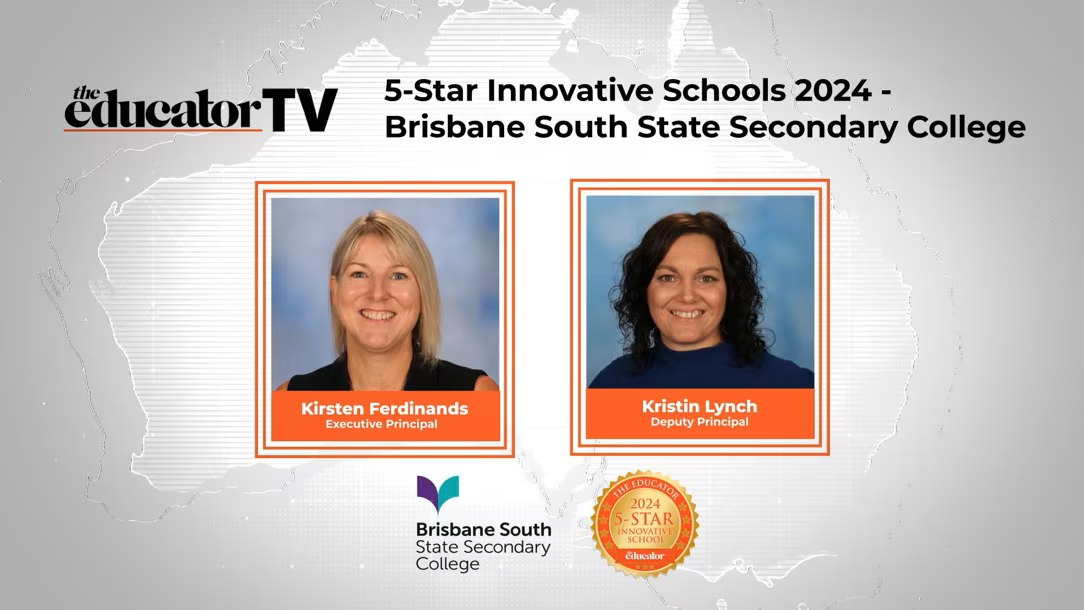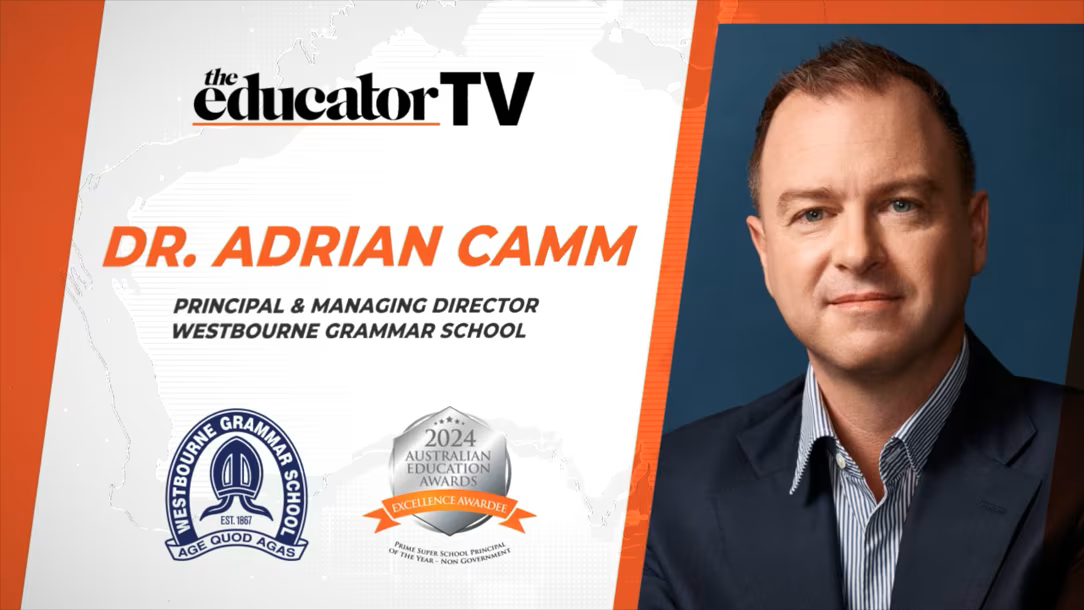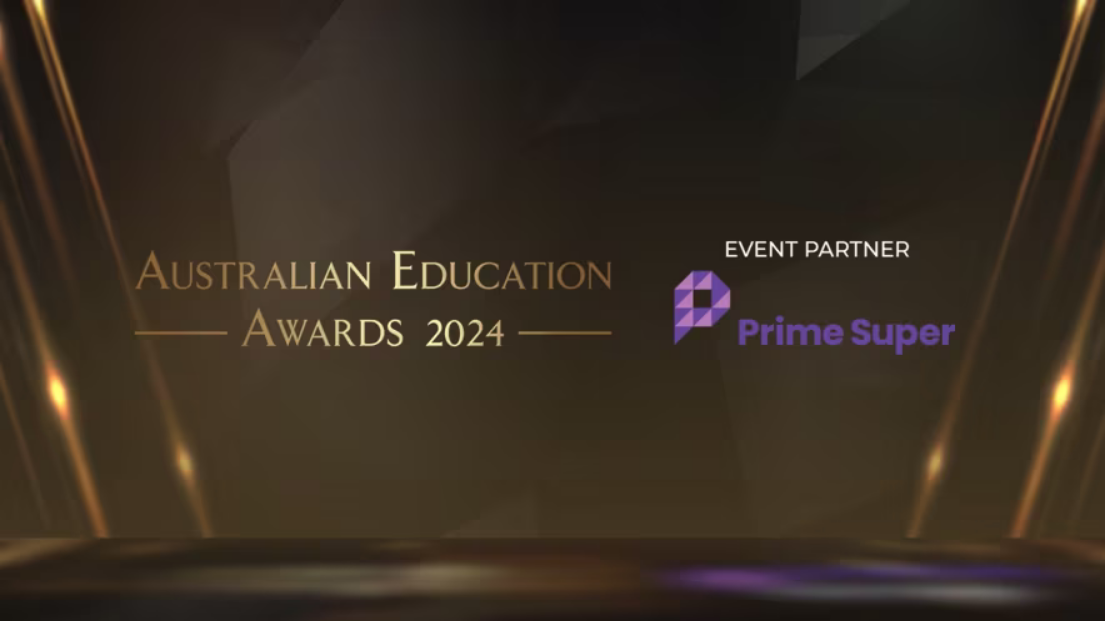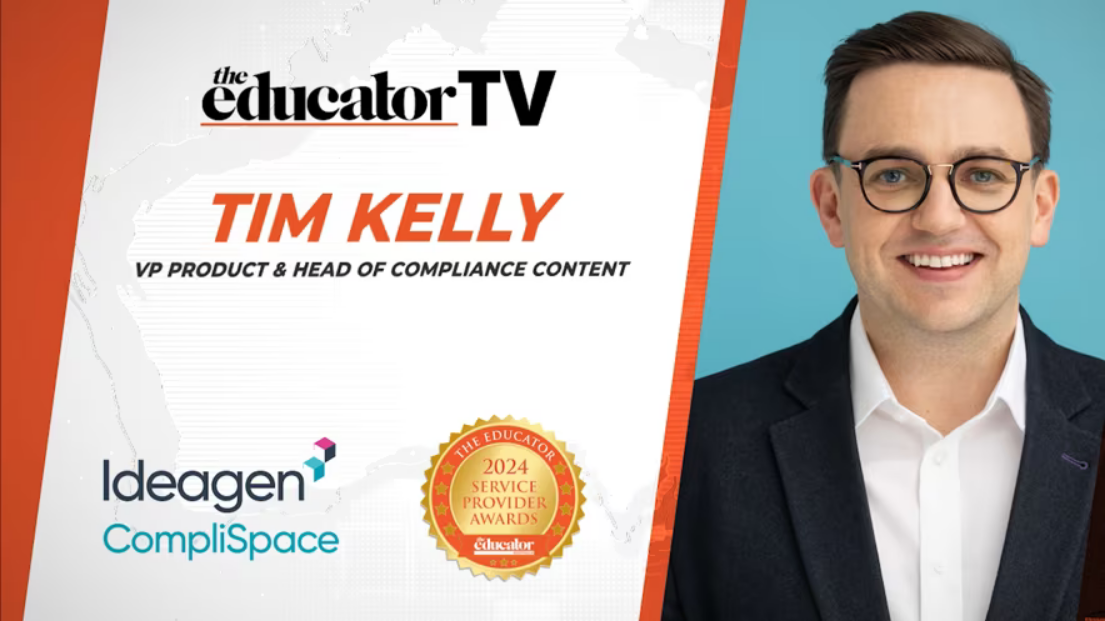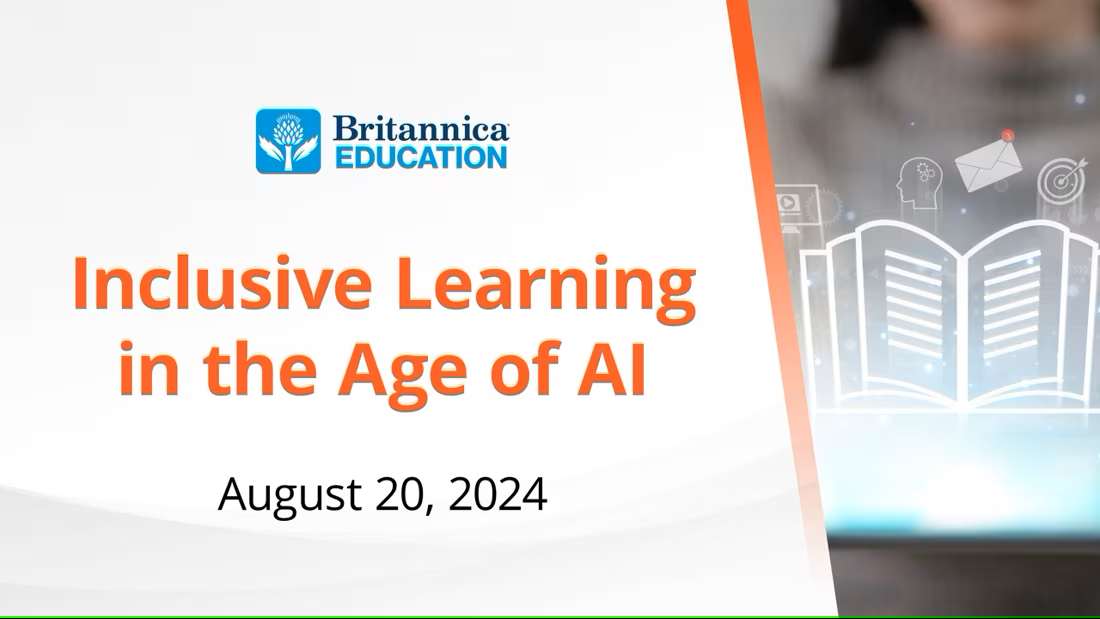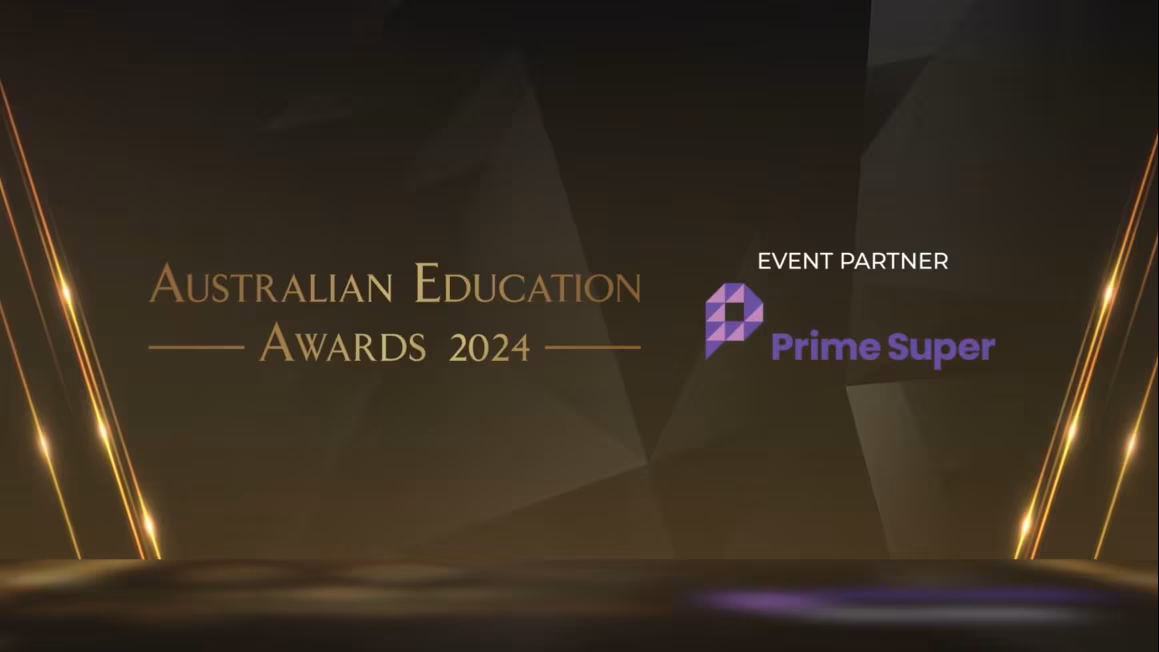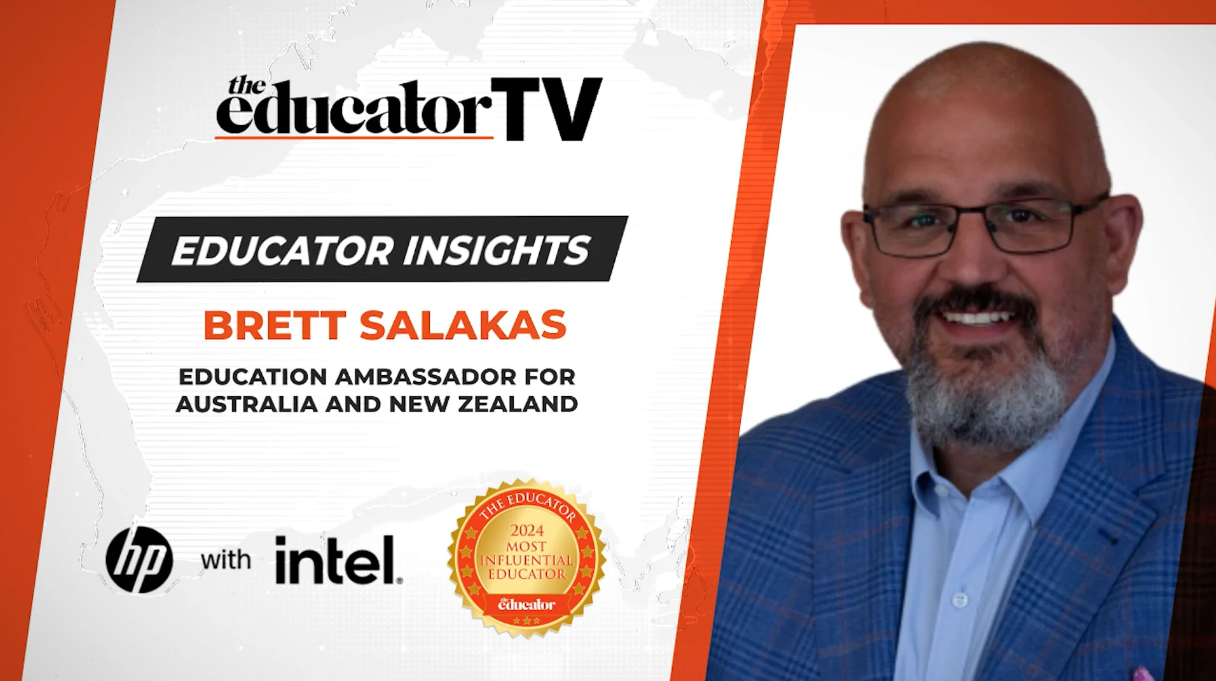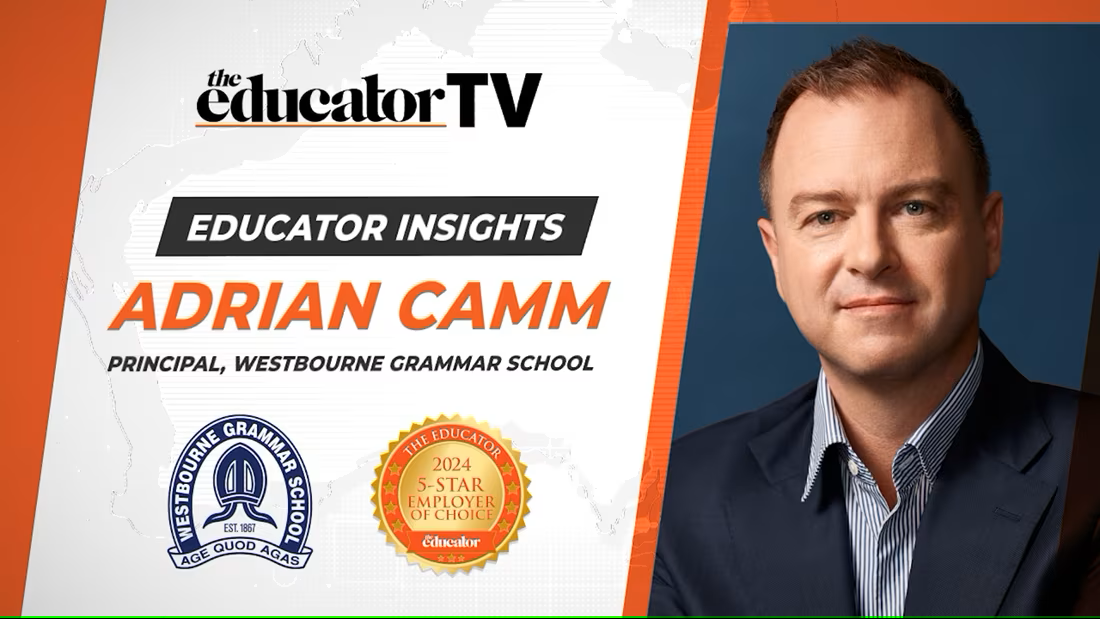Visionary principal turns bold ideas into action
The Educator speaks to Marquardt about how he has transformed the school’s culture through a strong focus on enhanced pedagogy, professional learning and a forward-thinking approach to using technology for impact.
To view full transcript, please click here
Brett: [00:00:11] Hello and welcome to all of our viewers. My name is Brett Henebery, editor at The Educator. And joining me today is Stuart Marquardt, the principal of Lindisfarne Anglican Grammar School. In addition to being a school principal, Stuart is vice president of the North Coast Independent School Sporting Association, the chair of the Collegial Support Committee for a New South Wales branch and also a member of a New South Wales state executive committee. Stuart was the 2021 Australian school principal of the year in the non-government category and this year Stuart has been nominated as the non-government school principal of the year. Stuart It sounds like another very successful year ahead for Lindisfarne Anglican Grammar School. Congratulations again on your nomination and thank you for putting aside the time to join us.
Stuart: [00:00:57] Thanks, Brett.
Brett: [00:00:59] Now, Stuart, just first of all, can you tell our viewers a bit about your approach to education and how this informs your style of leadership?
Stuart: [00:01:06] Look, I've got a very inclusive approach to education. I believe in the unique potential of each student and that every student can learn. And some students learn more slowly and some learn more quickly. But all young people are capable of learning and also a very pastoral approach. I really believe that every child matters every day and that the work we do as educators and in schools builds young people of great capacity and capability for for the future. And as a school, then I believe that education should embrace all learning. So the learning in the classroom is incredibly important, obviously, but the learning beyond the classroom, the learning across the curriculum, the learning beyond the school, they're all equally as important. And as a school that believes in the unique potential of each young person, obviously the education of the whole child is very, very important to us. We believe that, yes, we must have great academic programs that build the intellectual capacity of the young people here at the school. But we must have sporting programs, programs that promote the physical development of young people, a cultural programs across the arts, the drama, the visual arts, the dance, for example, and how that helps young people to grow and develop a focus on leadership and personal development and spiritual development. They all matter. So this is the important work of the school and the important work of education. And I believe that at the bigger picture of education is helping young people to develop good judgment, to contribute to the world at the local, national and international level that will help leave the world better than they found it and we found it. That will help develop the capacity to solve the complex problems that we face in our world today and to live lives of purpose beyond our school. So there's some of the core beliefs behind what we do here at Lindisfarne and what I personally believe about education and learning in schools.
Brett: [00:03:34] You've certainly done a lot of work since stepping into the role there. One of your first actions as principal was to to launch awards and all audit of the school's culture. What did this audit look like and how has it changed the school's culture since then?
Stuart: [00:03:51] Well, one of the things that was really important was that we actually had an external provider conduct the audit for us, and that was Dr. Phil Cummings from the then Circle Group Schools of Tomorrow Now. But look, Phil, being an external consultant, conducting the auditor, I think people were prepared to share fully knowing that they wouldn't be identified how they were feeling about the school and. Somewhat sadly, people weren't feeling very good about the school at all, and this was fairly widespread amongst the parent community, the wider community, the staff, the student body. And some of the common themes were things around that we were too inwardly focused. We didn't have a global perspective. We had a no culture. Anything that was suggested to improve the school, we would automatically say no rather than consider that we had a narrow offering of programs that we weren't overly focused on building students capacities, whether they be in the academic fields or the cultural fields or the sporting fields, and that we had a lot of work to do. And the audit really touched on every aspect of a school, from the curriculum to assessment to community engagement to parent involvement to co-curricular offerings. And so it was very, very broad and really well responded to over 400 respondents. So we really got a good read on where we're at now. The good thing about that was we had a courageous chair of our school council who said, let's present all of the information to key stakeholder groups as it's been given to us. We won't gloss over it is what it is, but it's our starting point. And that was a very good starting point indeed. And out of that we started to make some really important decisions. We decided. Who are we as a school? We decided that we're an Anglican school or a co-educational school, that we aspire to be a world class school and that we serve the children of the Southern Gold Coast, the Tweed Coast, the northern New South Wales. That was really important because our catchments from Robina in Queensland to Byron Bay in northern New South Wales and out to UK in the country town areas behind Lindisfarne. So this was important and then we already had three foundational values, but we needed to start to live those values with intent. So compassion, wisdom and respect at the core of what we do. And then we decided that we'd need some cultural drivers. And this was all done with the key stakeholder groups the parents, the students, the alumni, the wider community, the staff, the school council, the Diocese of Grafton. And we decided that we would have standards, collaboration and leadership as our cultural drive, as high standards and everything. We do a focus on leadership at all levels of the school and a collaborative approach. And through this we developed what we call our culture of yes, which is an openness to hear from people, the ideas they have to build and improve the school, to not likely dismiss an idea, even if the idea may not be quite right for now to say, well, that's a great idea for a year or two. Well, that's a great idea five years from now. But most things that are suggested, we end up implementing, and we decided that we needed some pillars to build our school on. So the pillars are achievement. We want to raise our achievement across the board relationships, quality relationships with all members of our school community and beyond communication, telling our story, telling people what we do. We were doing a lot of great things, but we weren't telling anyone about what we were doing. Initiatives. There were a whole range of issues that were needed to improve the school, particularly around facilities and infrastructure, and that if we did those first four well, we would strengthen our reputation. And that's been at the core of what we've attempted to do because we want to be the school of choice in this part of the world. We believe we're moving towards that rapidly and that we have created a really aspirational culture that we're living and breathing each day that we're excited about. And we certainly have become more globally focused looking not just at our region but beyond our region, our role within Australia and our role globally as a school. And to that end, we've joined the Round School Alliance across the globe, 200 schools who share the common ideals of internationalism or globalisation, as we would say, democracy, environmentalism or sustainability, as we would say adventure, leadership and service. And that fits really well with what we talk about and live out as the Lindisfarne way. The things that I've just out flying, that's the way we go about things here at Lindisfarne, and it's given us a real focus, and it's part of that. We run two campuses, one school, and we have the P to four campus at Tweed Heads where the school was started. And that covers stages one and two of the New South Wales curriculum. And at Mars line we have a 5 to 8 middle school, quite unique. And Australian education covers the last two years of primary, in the first two years of secondary and stages three and four of the New South Wales curriculum, and then a future focused senior school that covers stage five and six in New South Wales curriculum. That's a story our school community has brought into. It makes sense to our community and it's worked very, very well for us and that's given us the leverage to be able to move forward as a school.
Brett: [00:09:46] And even during some of the most difficult times of the school's history, it's really done very well. The school's HSC class of 2020 finished in the top 200 in the state. How did you manage to keep the community so focused during such a turbulent year?
Stuart: [00:10:04] Look, it really was teamwork and an approach, I guess, that we took around being agile, being adaptable and being flexible. We were very, very fortunate that we have a really leading edge technology program here. Every student in the school is provided a device as a learning tool as part of attending the school. It's not an add on. It's a core part of learning here at Lindisfarne and in the junior school, that's an iPad, and it's kept at school normally, but not during the pandemic. And in the years five and six. It's also an iPad but had been taken home and is 7 to 12. It's a MacBook Air and we have a whole platform. That sits behind that, that all staff and students and parents were used to using. And so for our senior students particularly, but also students in the younger years as well, we had a stable learning platform that made sense. There was no there were no equity issues. You know, every student had access to that quality device. Every student had access to high quality online learning. Every student had access to Google classrooms and all of the resources for the various courses. And that allowed every student to remain as focused as they could, given that they were living and experiencing a global pandemic for the first time. In addition, pastoral care continued, so teachers work the phones. They rang their home room or their house tutor groups regularly. They followed up on students who didn't attend class. And why weren't they? Online. Why weren't they in the class? What was the reason? And did they need anything else else from the school? Were they struggling? Did they need to talk to someone? The chaplain, the counselor, the school psychologist? So all those support networks were maintained. You know, teachers are very, very dedicated here. They ran additional online tutorials. And as a leadership team, we made a commitment to the student body that we would maintain hope in those important rites of passage celebrations that students were looking forward to, that they would be there, that we would do the hard work. We would put the heads down. We'd remain on task. And the celebrations would come later than they usually would, but the celebrations would still be there. Now, fortunately, an easing of restrictions allow that to happen. So we gamble to a degree. What if we couldn't deliver on that promise and that ironclad commitment? I really stood up and delivered as principal that it would happen. We could have been caught short on that. Fortunately we weren't, and we delivered on that as well. I think for the students, you know, you've got to give a lot of credit to their resilience. Whilst we remain proactive and positive in our messaging, the students ultimately still have to do the work. So they remain focused throughout. And I think how does that come to be? It certainly is a three way partnership as a school. Positive, constructive, reassuring messaging. A parent community who supported the school? Absolutely. Widespread encouragement, very, very minimal, if any criticism. And, of course, the student body who brought into what was going to be possible. And in the end, we achieved terrific results, our best results we'd ever achieved. And we're incredibly proud of that. But we're mostly proud of the students. We talked a lot with the students about their place in history, that they would be remembered not just in this school, but across the nation and indeed globally as the year group that the first year group in 100 years to complete their schooling in a pandemic. I even shared a few stories in the school newsletter from 1920. Schooling and learning. That was. You know, delivered by post and students who learnt at home for a year by snail mail. And if they could do that, then we could certainly do what we need it to do now.
Brett: [00:14:36] What a message. How did they how did they react to that?
Stuart: [00:14:40] Oh, look, they were amazing, really, in how they jumped on board. Of course, you get people who become anxious. Some some of our staff. I was anxious at times, but we overcome our fears by action. I mean the answers in the doing so they responded really, really well. It's about building belief, isn't it? And yes, there'll be people sometimes question is, is this really going to work? But we built that belief at all levels and I'm very grateful to how the school worked together to achieve that for our students.
Brett: [00:15:15] That's wonderful. With 2022 well underway now, what is your major focus in the school's major focus moving forward this year?
Stuart: [00:15:25] We've got a few areas, of course, multiple, multiple areas we're working on, but a few areas look, our Anglican identity is important to us, our relationship with our founding parish, that we're remaining true to that relationship that we're living out what it means to be an Anglican school, that we're valuing all of the young people in our school, that we're developing them holistically, that we're encouraging them to develop their gifts and passions and talents and in fact putting programmes in place to support that. And that in that context, that we're also working with the wider community, particularly with the elders of the Bundjalung people, the traditional custodians of this land, this land I'm talking to you from today and and the enormous respect we have for the Elders past, present and emerging. And we want to deepen that connection. So we've got a big focus on our reconciliation action plan this year to really develop that fully and to live that plan, we believe we can do a great deal to encourage our next generation to help build stronger relationships with our First Nations people. I think it's really at the heart of our nation, so that's a big focus area. Wellbeing and pastoral programs, a huge focus across the whole school. For us. We have students and families and staff entering the third year of pandemic. People have spent a lot of time at home on devices disconnected. So there's a huge focus on reconnecting as a community and really supporting the wellbeing of the young people, but also the staff and the community. A big focus on teaching and learning, improving our results further on our data and reporting and assessment and also just on our performance development for our staff. We want to continue to build the capacity of our learning organisation. To that end, we have a staffing profile that's exciting with early career mid-career, late career and elders making up our staff and we're celebrating that. We're enjoying that. That's been a big focus. That's been a deliberate thing to have staff at all stages of career progression. We believe that's creating a richer learning environment for our students, so that's a big piece of work and community engagement. We want to tell our Lindisfarne stories to our community. We want to celebrate the good work that we're doing and we want to share that with our community. And to that end, we're creating a few platforms a Lindisfarne business network, a Lindisfarne alumni network and a Lindisfarne Futures Network. So those three networks will be all established by the end of this year, and they'll be important community engagement platforms for us. But the work of the school continues around that raising standards, collaborative learning, strong leadership culture throughout the organisation at all levels, and focusing on our achievement and our relationships and our communication. So some of the main areas, a big piece of work that we don't talk much about is schools, is really the facilities and the master planning work that we're doing. We just completed a beautiful middle school building that will really support our students in the middle years. It's got beautiful collaborative space indoors and outdoors. We've commenced construction of an early learning centre, which will be a beautiful place for our preschool and kindergarten students. And we have a development application in for a senior centre that will have a really a tertiary. Feel and we hope to start construction by the end of the year. And that will be really a center for our year 12 students, although all senior school students will have access to that building. But it will be a home for our year 12. We believe the work that Year 12 have done over the last couple of years with their teachers, support staff and parents, that to create a facility that the year 12 is are based out of will send a message to our community of the work that's being done and the work that's still to come. And we always talk about with our students, it's not just who we are, it's who we are becoming.
Brett: [00:19:57] That's a powerful message. And I think all those things, when taken together, really look like a very exciting year for the school. So how do you do you think it's all tracking? Well, so far.
Stuart: [00:20:13] We're pretty excited about 2022. Like every school across the nation, we've had a remarkable first term and we've remained focused on continuing to be future focused and progress our school. But we've done that in an environment of constant COVID issues to deal with staff away, parents away, students away. We've survived incredible floods in this region. They've had a profound impact on the whole region, including members of our school community. It'll be years of recovery for some parts of this region and some of our school families and we're working there. But in amongst all that, we've been celebrating some remarkable achievements and we've even managed to roll out a school musical we had We Will Rock You. It was exciting. We finished the term with it, the music of Queen. We saved rock and roll forever, and of course we were able to deliver that production without ever having the whole cast and the whole crew in the one place at the one time, including on closing night, we never actually got one rehearsal or one performance in with everyone there, but. You know, you've just got to keep moving forward. You know, some days in this pandemic era, it's two steps forward and three backwards. But then you turn it and flip it and it's three steps forward and two backwards. And we're constantly focused on moving forward and dealing with the cards that we've been dealt in that adaptable, agile and very considered and calm way.
Brett: [00:22:04] Well, you're certainly doing a very successful job there. So congratulations again on your nomination. And thank you again for joining us.
Stuart: [00:22:13] Thank you very much. It's always great to talk about the work at Lindisfarne and the Lindisfarne way, so thanks, Brett, for your time today and all the best to all of the schools around Australia and have a great 2022.
Brett: [00:22:29] Thank you, Stuart. All the best for term 2.
Stuart: [00:22:32] Thank you.
Brett: [00:22:33] To watch more of these videos, please visit the educator online at www.theeducatoronline.com.




